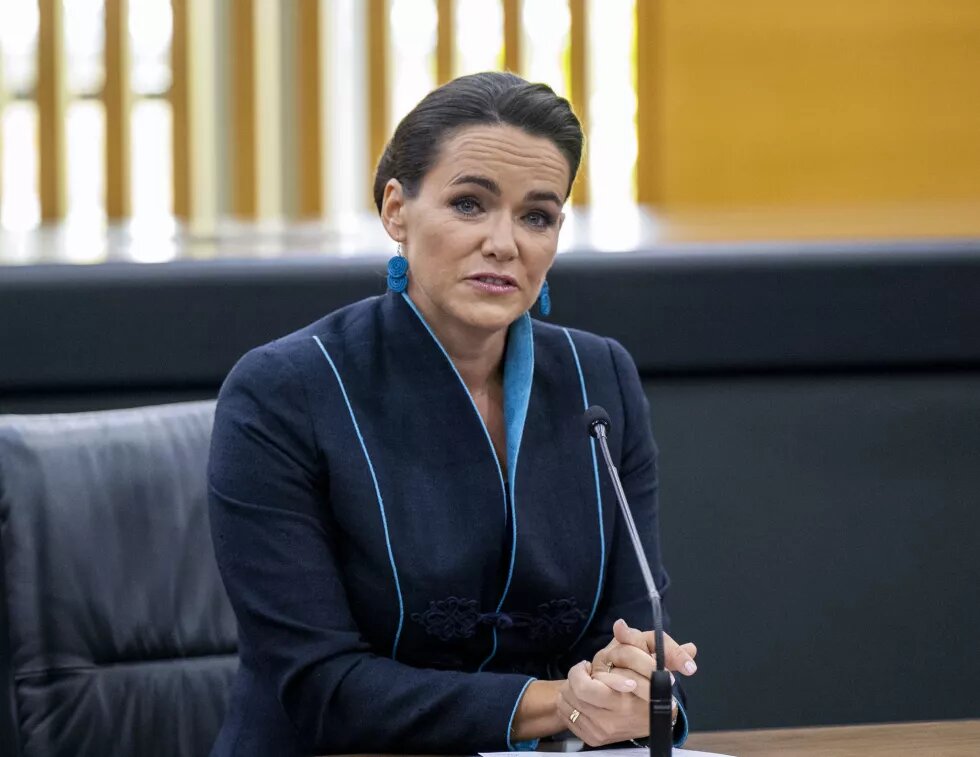The recent pedophile scandal shattered a fundamental element of the Orbán regime's identity, but in the absence of a political alternative, no significant number of Fidesz voters are expected to turn a cold shoulder to Orbán. Nevertheless, the Hungarian Prime Minister’s credibility among his supporters is at its highest level of risk since he came to power in 2010. The issue is likely to remain on the agenda, as there is no response to the core question of who influenced the pardon of the pedophile director's accomplice.

An unforeseen scandal
On 10 February, President of the Republic Katalin Novák and former Justice Minister Judit Varga, MP, who was set to head the Fidesz list for the 9 June European Parliament elections, resigned. Their resignations were undoubtedly decided upon the instruction of Prime Minister Viktor Orbán. Both politicians were prominent figures in the Orbán regime.
The reason for their downfall is that on 2 February, it became public that during the Pope's visit to Budapest in April 2023, President Novák had pardoned the former deputy director of a children's home who had blackmailed several children into withdrawing their testimonies against the pedophile director.
Given the ruling party's dominance both in power and in the public sphere, it is unusual for Fidesz to be forced into a defensive position. Yet, it happened immediately after the pardon scandal exploded. The confusion of Fidesz politicians was palpable for days: first, they kept their silence, then they tried to defend the decision, then they tried to shift the pedophilia accusation to the opposition. None of these tactics worked, so on 8 February, the prime minister attempted to take the initiative and close the case by announcing a constitutional amendment. Under the proposed amendment, convicted persons involved in offences against minors would not be eligible for a presidential pardon.
However, Prime Minister Orbán also acknowledged that a mistake had been made and shifted the blame to President Novák, even though in terms of public law, the direct political responsibility for the decision lay with the then Minister of Justice Varga, i.e., the government. Thus, alongside Katalin Novák, Judit Varga had to resign from all her positions two days later.
The scandal caused significant outrage among Fidesz’s voter base, and this time, the ruling party failed to shift the blame to external actors. The pedophile stigma that Fidesz has used for years and pinned on others has now been burned onto Katalin Novák and Judit Varga. Ultimately, they have become victims of the political system and the social environment created by their own party.
It is still unknown why the president's office made their decision, but Zoltán Balog, the leader of the Reformed Church of Hungary, a former minister and advisor to President Novák who has long-standing close ties to the Orbán family, admitted that he agreed on giving the pardon. After a few days of hesitating, he resigned from his leadership position in the Reformed Church on 16 February, but it remains unknown who asked him to lobby for the pardon.
The societal anger caused by the scandal was on display during a protest organized by influencers on 16 February, which brought more people into the streets about an issue uncomfortable to the cabinet than almost any other protest since 2010. The donation campaign launched during the demonstration collected more money than anticipated (about HUF 220 million, EUR 567,000) to help accommodate several youngsters after they had to leave the orphanage. However, it is questionable whether the action will have any longer-term political effects after reaching its direct goals, as it is currently unknown if the organizers want to use the demonstration for any political action apart from the topic of protecting children.
From the ruling party’s point of view, the case is further aggravated by the fact that the ex-husband of the resigned Judit Varga, Péter Magyar, came out in public and suggested that "the real culprits" were not those involved in the scandal. He criticized the functioning of the system, calling it unacceptable that "half of the country is owned by a handful of families" and said that Head of Cabinet of the Prime Minister Antal Rogán, who controls both the civil secret services and government propaganda, "has to go". Péter Magyar did not say anything that had not already been reported by institutions analyzing the Orbán regime, including Political Capital, researchers, and the media. Still, the significance of his criticism is that it comes from a man who, through his wife, has had access to the highest government circles for years and has held important economic positions in the regime, so he has a considerable wealth of knowledge. An intense governmental smear campaign against him was launched immediately after his statements came to light.
No great expectations are justified
The scandal has the potential to awaken anti-government voters, but if opposition parties fail to channel their anger and establish political alternatives, it may swiftly go away. While they were able to thematize the issue with several acts after the pardon decision was made public (such as highlighting the government's responsibility), it appears that they have subsequently resorted to competing with one another.
This is the main reason Fidesz does not seem to be in danger in the short term. In the absence of a political alternative, no significant amount of voter migration from the governing party to the opposition is expected. Though Péter Magyar is rumored to be forming a new party, it is very unlikely that he could attract a critical mass from the Fidesz voter base.
However, the whole scandal poses a threat to Fidesz’s credibility. Though Viktor Orbán seemed determined in shutting the story down, the topic of child protection seems to remain fixed on the agenda, and not in the way Fidesz wants it. Though they announced a handful of measures they plan to take (the penalties for pedophile offenses will be tightened; sexual crimes against people under the age of 18 should never expire; there will be no chance of parole for such convicted individuals), the media keeps uncovering further pedophile stories, which shows that the specific issue was not an exception, but rather a symptom of the way the state-run children’s homes operate.
Immediately after the dual resignation, the ruling party’s propaganda began to insist that the case was closed, that those responsible had made the necessary decision, and that the ruling party was morally superior to the opposition, where there were never consequences for any mistakes. Yet the scandal is not over, and not just because the narrative is far from being true.
For the moment, it seems unlikely that Viktor Orbán's reputation among his supporters will be damaged, but one thing is certain: in the last 14 years, he has never faced a comparable threat to his credibility.


